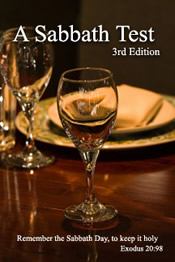


Argument VII
An Ox in a Ditch
I can of my own self do nothing: as I hear, I judge:
and my judgment is just: because I seek not my own will,
but the will of the Father which has sent me
~John 5:30~
One of the more popular arguments for going to restaurants on the Sabbath is based on the principle of “an ox in a ditch.” This argument is driven by the belief that circumstances beyond the Sabbath-keeper’s control might necessitate having to purchase a meal on the Sabbath. Therefore, because emergencies do arise from time to time and take a variety of forms, it is up to the conscience of the “believer” to determine if it would be appropriate to go to a restaurant on God’s day.
This is a very interesting argument primarily because it has very little to do with an ox and more to do with Prime Rib or Chicken Tarragon. In other words, as a general rule, the advocates of this reasoning are using it to justify their appetite for pleasure as opposed to exploring how God truly wants His people to manage genuine emergencies. This truth becomes evident when you consider how Sabbath dining advocates define what constitutes an “ox in a ditch.” For most, just about anything meets this criteria. Consider some reasons actually advanced by leaders in God’s Church as “an ox in a ditch.”
These are just a few of dozens of “reasons” God’s people have advanced as legitimate emergencies when justifying dining out going on the Sabbath. But the real question that needs to be addressed is:
Where is the ox and where is the ditch?
If God’s people are going to invoke the principle of “an ox in a ditch” to justify dining out on the Sabbath, they would be well advised to understand the principle the Messiah was conveying when giving this lesson.
An Ox in a Ditch
When Jesus gave this very important principle regarding the Sabbath, He was dining at the home of a prominent Pharisee. Also there was a man suffering from “dropsy,” an abnormal and painful accumulation of fluid in the tissue of the body. Some believe this man was placed in front of Jesus in an attempt to see if He would heal on the Sabbath. Others have suggested that Jesus Himself may have orchestrated this event in order to present this teaching. Whatever the case, the Messiah seized upon this moment to teach a valuable lesson about compassion. He began by asking these religious leaders if it was wrong to heal on the Sabbath. When they did not answer Him, Jesus healed the man. Perhaps anticipating a reaction, Jesus posed another question:
Which of you shall have an ass or an ox fallen into a pit, and will not straightway pull him out on the Sabbath day? (Lk. 14:5)
Jesus’ question silenced these men because it not only appealed to their understanding of the scriptures, but to rabbinical law which also provided for such acts of mercy. By invoking the law, Jesus was cutting through all the potential arguments these men may have been crafting. However, His words and actions were saying much more. The point He was making was that sometimes life does not go according to plan—there can be unexpected twists and turns. In short: an ox can fall into a pit.
The action Jesus took illustrated that when there is danger to life or property, God understands and even expects His children to take measures to correct the problem, even if it occurs on His Sabbath. In other words, save the ox.
This principle can be applied to other situations in life. There may be a time when the car breaks down or an injury occurs. These are not planned events. They are unforeseen emergencies. The fact is that our lives can be interrupted by events that are simply beyond our control.
However, there is a principle here that must be respected. The ox in a ditch is the exception, not the rule. In other words, just because you had to change a flat tire last Sabbath does not mean it is okay to rotate the tires next Sabbath.
A Genuine Emergency
There are times when purchasing something on the Sabbath might also be appropriate based on the principle of an ox in a ditch. For example: suppose you are taking a Sabbath walk and notice an elderly gentleman has collapsed on the sidewalk. When you approach to offer assistance, he informs you that he is diabetic and asks if you could buy him a specific kind of candy bar. Across the street is a convenience store and in your pocket is a five dollar bill. This is an ox in a ditch. This act is not about engaging in business on the Sabbath. It is about healing on the Sabbath. This being the case, there may be times when it might be necessary to buy food on this day. But this should only take place in a genuine emergency where the alternative may be catastrophic.
Additionally, it is important to understand what an ox in a ditch is not. Poor planning is not an ox in a ditch. A messy home that is not ready for company is not an ox in a ditch. Running into old friends that you haven’t seen in years is not an ox in a ditch. An ox in a ditch is something to regret, not something to anticipate – or even celebrate.
Furthermore, when Jesus gave the lesson of an ox in a ditch, it was in the context of healing, not dining. The principle is there to be sure, but it is not to be manipulated. To do so would be a HUGE mistake. Those who use Jesus’ teaching regarding an ox in a ditch to justify going to restaurants on the Sabbath should ask themselves, “Is it really an emergency?” Or is it possible that you are just exploiting for your own benefit the compassion and mercy of the very Savior who made provisions for dealing with a real tragedy that may arise on God’s holy Sabbath?
A Final Thought
The Sabbath is a day with profound meaning. It was created by God as evidence that He has an incredible plan for mankind. That plan reflects a great wisdom and an infinite love for His children. God made the Sabbath so that His children could know Him and the hope of His Kingdom. The Sabbath pictures that Kingdom. And those who honor it honor what it pictures.
When God gave the command to remember the Sabbath day and keep it holy, He wasn’t simply instructing the children of Israel to be aware of when this day occurs. It is not simply a cognitive test of knowledge. The Sabbath is a test of faith—a test to see if His people will declare their loyalty to Him and His kingdom (Ex. 16:4).
Honoring God’s Sabbath is done by acting out that kingdom every week. In a very real sense, God’s Sabbath is His signature on a great moral code Jesus described in one word: LOVE. Honoring this day as God instructed is the profound responsibility of every true Christian. But there is more. To keep the Sabbath as God commands is also a great privilege—one that is known by so few. God’s people should see it as an honor bestowed upon them by none other than the King of Eternity.
Does it matter which day is kept as the Sabbath? YES! Because the Great God said it does. Does it matter how that day is kept? YES AGAIN! Because the Great God said it does.
Finally, does man have the authority to decide for himself how he will honor the day God sanctified? Think about that question very carefully the next time you pick up a menu on Holy time.

